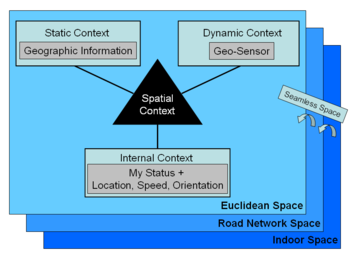
Cognitive geography is an interdisciplinary study of cognitive science and geography. It aims to understand how humans view space, place, and environment. It involves formalizing factors that influence our spatial cognition to create a more effective representation of space. These improved models assist in a variety of issues, for example, developing maps that communicate better, providing navigation instructions that are easier to follow, utilizing space more practically, accounting for the cultural differences on spatial thinking for more effective cross-cultural information exchange, and an overall increased understanding of our environment.
Notable researchers in this branch of geography include David Mark, Daniel Montello, Max J. Egenhofer, Andrew U. Frank, Christian Freksa, Edward Tolman, and Barbara Tversky, among others.
The conference on Spatial Information Theory (COSIT) is a biennial international conference with a focus on the theoretical aspect of space and spatial information.
The US National Research Council published a book titled, "Learning to think spatially (2006)" written by the Committee on Support for Thinking Spatially. The committee believes incorporating GIS and other spatial technologies in the K–12 curriculum would promote spatial thinking and reasoning.
© MMXXIII Rich X Search. We shall prevail. All rights reserved. Rich X Search
